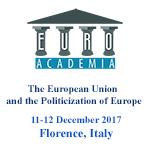Euroacademia Conferences
 Europe Inside-Out: Europe and Europeanness Exposed to Plural Observers (9th Edition) April 24 - 25, 2020
Europe Inside-Out: Europe and Europeanness Exposed to Plural Observers (9th Edition) April 24 - 25, 2020 Identities and Identifications: Politicized Uses of Collective Identities (9th Edition) June 12 - 13, 2020
Identities and Identifications: Politicized Uses of Collective Identities (9th Edition) June 12 - 13, 2020 8th Forum of Critical Studies: Asking Big Questions Again January 24 - 25, 2020
8th Forum of Critical Studies: Asking Big Questions Again January 24 - 25, 2020 Re-Inventing Eastern Europe (7th Edition) December 13 - 14, 2019
Re-Inventing Eastern Europe (7th Edition) December 13 - 14, 2019 The European Union and the Politicization of Europe (8th Edition) October 25 - 26, 2019
The European Union and the Politicization of Europe (8th Edition) October 25 - 26, 2019 Identities and Identifications: Politicized Uses of Collective Identities (8th Edition) June 28 - 29, 2019
Identities and Identifications: Politicized Uses of Collective Identities (8th Edition) June 28 - 29, 2019 The European Union and the Politicization of Europe (7th Edition) January 25 - 26, 2019
The European Union and the Politicization of Europe (7th Edition) January 25 - 26, 2019 7th Forum of Critical Studies: Asking Big Questions Again November 23 - 24, 2018
7th Forum of Critical Studies: Asking Big Questions Again November 23 - 24, 2018 Europe Inside-Out: Europe and Europeanness Exposed to Plural Observers (8th Edition) September 28 - 30, 2018
Europe Inside-Out: Europe and Europeanness Exposed to Plural Observers (8th Edition) September 28 - 30, 2018 Identities and Identifications: Politicized Uses of Collective Identities (7th Edition) June 14 - 15, 2018
Identities and Identifications: Politicized Uses of Collective Identities (7th Edition) June 14 - 15, 2018
Politicizing Europe: Normative Conditionality in the EU Institutions’ Interpretations of Europe(-anness)
-
-

-
Presentation speakers
- Annie Niessen, European Studies Unit, University of Liège, Belgium
- Download presentation
Abstract:
“Europe” and “Europeanness” have always been key notions in the construction process of the European Union (EU). Indeed, Article 49 of the Treaty on the European Union enshrines as primary condition that a State must be “European” to be eligible for EU membership. However, there is neither a consensual nor an official definition of this term which can take on various meanings, broadly ranging from geographical to cultural ones. This polysemy has driven the EU institutions to provide their own interpretations, especially within the framework of enlargements and membership applications. Building on an analysis of institutional documents, the paper investigates how the notions of “Europe” and “Europeanness” have been interpreted since the inception of the EU and, in fine, politicized through the implementation of normative conditions. This analysis eventually led to a new, up-to-date model of the conditions that a State has to meet to be considered “European”, which further highlights the institutional conceptualization of Europe(-anness).
-
Related Presentations

The European Union and the Politization of Europe: A Promise of Regionalisation under a New Common Roof, Caught in New Nationalism?
- Gerhard Eichweber

On Being European
- Ihsan Baris Gedizlioglu

The Cacophonic Concert of Europe: Between Nationalism and Grand Strategy
- Wolfgang Danspeckgruber
- Uriel Abulof













